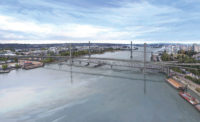Companies that rode the great commodities boom have been scrambling to diversify amid a steep decline in demand from China and other resource hungry developing nations.
The past week's stock-market free-fall in the People's Republic promises to further weaken demand.
But the so-called commodities supercycle that put engineering, construction and design firms to work on projects across the globe is no one-time quirk of history, but rather has simply taken a pause, a new report finds.
The supercyle saw the prices of dozens of commodities rise in “lockstep” from 2000 to 2012, with China accounting for 40% of all demand and other emerging market economies chipping in for more, finds “RiskMap 2016,” a report put out by London-based consulting firm Control Risks.
The boom went bust starting in 2012 as a slowing global economy, stockpiling of key commodities by the Chinese and a collapse in oil prices sent demand plummeting.
Now there are signs the decline in demand for commodities may have hit bottom, with some metal and alloy prices edging up as inventories are depleted, the report notes.
“The supercycle– like globalisation itself – has not died, so much as been temporarily kicked into reverse,” writes Michael Moran, managing director of Control Risks.
The turnaround, though, is not likely to happen overnight (story text continues after interactive graphic; mouse over graph lines to see exact values.)
With sluggish global growth, it will simply take longer to work through various commodity gluts.
Prices will stay low in 2016, with the recovery in commodity values likely to take the rest of the decade to work out, the report cautions.
And there will be no quick recovery in oil and gas prices, which have been the hardest hit of all.
The emergence of fracking in the U.S. and Saudi Arabia’s efforts to undercut the new competition by flooding the market helped tank oil and gas prices back in 2014.
Indeed, oil – the uber commodity – is an important outlier, and its price collapse in late 2014 is only partly tied to China,” Control Risks Moran notes.
Looking ahead, the U.S. fracking industry will remain a moderating influence on global oil demand, with the ability to quickly ramp up production should the Saudis decide to reverse direction and cut production, the report notes.
That is a big change from decades in which the Middle Eastern kingdom has had significant power, all on its own, to push global oil prices up and down.
“In effect, U.S. fracking’s ability to ramp up and slow down with minimal damage to the larger U.S. economy has created a price ceiling above which a major surge in U.S. production will quickly follow,” Moran writes.





